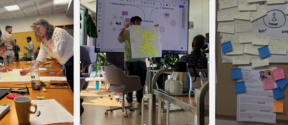Towards a Constructive Critique of Transdisciplinary Design
Antti Ahlava
[Link to a larger version of the flowchart]
Before one can in any sensible way approach the issue mentioned in the title, one must contemplate a more profound question: what do we mean by constructive critique in design? Because of the elemental nature of the question, one should also approach another dilemma: what is the aim of design and its methods? Is this perhaps to fulfill our needs and add enjoyment? Let's assume that it is. In that case, the target of transdisciplinary design and design methods in general, would be to advance people's satisfaction and pleasure. This is a quite common presupposition in both utilitarian design theory and in the aesthetic approach to design. Jeremy Bentham (2012), the philosopher regarded as the founder of utilitarianism in the 18th century, described the rationality of this approach in the following manner: “It is the greatest happiness of the greatest number that is the measure of right and wrong”, and Bentham’s imperative of well-being through pleasure and utility can well be identified in modernist design doctrines such as rationalism and functionalism – satisfying needs of people by the means of architecture and thinking that this would make them happy. Utilitarianism is based on hedonism of the majority, which sometimes might override demands for practicality – Rem Koolhaas' urbanism based on conscious methods of hedonism (see e.g., Koolhaas 1978) is a fine example of this. However, the problem with the utilitarian and pleasure-seeking view is that behind the need satisfying and enjoyment-based motivations there is a shallow understanding of psychology. The fixation on the need-satisfaction pattern may distance us from other and potentially more profound considerations for the development of design. This philosophical and societal problem is well described by the Slovenian philosopher Slavoj Žižek, who writes in his book The Parallax View (2009), that – Žižek bases his argument here on Jacques Lacan's psychoanalytical theory – people don't want what they think they want and that it is the drive to constantly need and desire more, to continue desiring, which is more elemental for humans than attaining something. In this perspective, the idea that design should satisfy needs or desires can appear questionable.

[Link to a larger version of the flowchart]
Slavoj Žižek is a Slovenian philosopher, cultural critic, and psychoanalytic theorist known for his critique of ideology and his analysis of popular culture. For him, a need is not necessarily anything biological, but rather a habit and a source of pleasure stemming from our urge to be mentally stuck within a particular structure of the symbolic network that is grounded in fantasy. Instead of the obsession with happiness, Žižek – along the lines of Hegelian philosophy in addition to Lacan's theory – urges us to make inquiries into the real meaning and critique of pleasure, paying attention to the motivation and pursuit itself. This includes the research on ethical choices instead of blindly striving for the object of desire through the satisfaction of a need. Žižek explains convincingly how the function of a need is to attach us to hegemonic power whether it is the ideology of administrational regulation, the neoliberal ideology of competition or the contemporary “biopolitical” imperative for people to enjoy and have fun not only in free time but also at work.
Žižek's work has been influential in a wide range of fields, including philosophy, psychology, cultural studies, and design theory. In his analysis, consequences from the derogatory obsession with pleasure and enjoyment are for example the problem with how to control "too muchness" (which he claims might be the most common cause of stress nowadays), constant "self-revolutionising" and "narcissistic self-realisation", all familiar in contemporary worklife. Žižek says that the cultural imperative or hegemonic discourse to enjoy – also including such basically noble aspirations as to enjoy professional achievement or ethical awakening – should be moved to a radical level where it is not allowed to enjoy (Žižek, 2009). This advice might appear harsh or paradoxical, but Žižek bases his guidance on the Lacanian interpretation of the strive towards obsessional enjoyment, where this psychological tendency is a neurotic symptom covering anxiety between conscious and subconscious motivations. If we assume that this analysis is correct, one could argue that design and its methods should rather be ethical than aesthetic, or at least, the role of aesthetics in design should be justified by ethics rather than by a desire or needs. Moreover, it is important to understand in this context that even if some might consider that answering so-called basic needs is ethical – such as food and housing – it is the obsessional dependence on the logic of need satisfaction which undermines the ethicality of this claim. It is necessary to point out that in Žižek's philosophy of ideologies, ethical critique and development should not at all be repetition of hegemonic ideologies, but the critique should be elevated to a radical level, where this can influence the foundations of ideologies. That is constructive critique.
In this sense, a design method should start by identifying ideological assumptions underlying the design problem. According to Žižek, ideology operates at the level of the unconscious, shaping our perceptions and beliefs without our knowledge or consent. Following design theorist Chris Rose's words (2006) there is a difference between what might be going on and what we prefer to think is going on. To pursue a design method basing on Žižek's theory, designers need to identify the underlying ideological assumptions of the design problem they are working on. For example, a design task might assume that people want to better satisfy they needs, without considering the environmental impact or the effects of too-muchness on people's life. Once the ideological assumptions of a design problem are identified, designers need to critically analyse the ideological framework. Žižek argues that we need to engage in a radical critique of ideology, exposing its contradictions and challenging its assumptions. Therefore, designers need to ask questions such as: How does the current design problem contribute to wider ideological problems? What are the contradictions inherent in the design problem?
In Žižek's philosophy, effective critique should raise over the false pretensions of politically correct thinking. Examples of shallow ideological correctness in design are such ritual practices as constant evaluation (typical for performative and evidence-based design), references to empty universalities, which in conditions without recognised internal struggle and paradoxes can include the mentioned derogatory need satisfaction, petty problem-solving, pursuit to happiness, resilience, ecosystems, empowerment, sustainability, creativity, participation for participation's sake, as well as such buzzwords and concepts as “new normal”, “diversity”, “synergy”, “disruption” and “digital transformation”.
Participation can become an ideology. As Sorochan (2017) points out, local participation operates in terms of what Slavoj Žižek refers to as a mode of enjoyment and is connected to exploitation. What is of central importance in the participatory culture is the desire for participation. Social actors place their hopes in participation as a principle in their vision of social “transformation”, but it remains questionable if this is the way to realise democratic power or change. Sorochan defines the symptomatic "participatory complex" based on a valuation of activity over passivity; the privileging of procedure or structure over ends; a desire for immediacy and anti-representational attitudes; the privileging of face-to-face encounters or bodily co-presence; an orientation towards inclusiveness and pluralism; a will to consensus; and discourses of empowerment through personalization. Through these motivations, participation incorporates energy, creativity, and labour into the reproduction of potentially damaging existing institutions and power structures. Using Žižek's words, this is ideological fantasy. Instead of solving small local problems we should change the very concept of good life (Žižek 2009). As Žižek writes in The Sublime Object of Ideology (2008), the instrumental reason used by the normative assumptions of political correctness is usually based on the fear of truth. In other words, instrumental reason is "a retreat from disturbing the system’s causes of political terror" (Žižek, 2009). For Žižek this ideological illusion consists of avoiding "disappointment with the object" – pretending that we are dealing with a fictitious appearance when “the truth is already there” (2008, 216). Confronting this radical illusion – ideological fantasy in Žižek's terms (2008, 29-30) – requires radical critique.
Trans-disciplinarity, as it is usually defined to be knowledge-producing, multidisciplinary both-and boundary work and collaboration between different "levels of reality": academic people from different fields and non-academic, often practitioners or professional people working together in complex and contextual situations (see, e.g. Tötzer et al 2011, Bernstein 2015, McGregor 2015 and Rigolot 2020), can be subjected to ideological critique in order to develop its better version. Žižek's theory offers methods that can be used in this pursuit, e.g., the method of short circuiting. It is not obvious to situate Žižek's psychologically based ideological criticism to such a pragmaticist issue as trans-disciplinarity, but as the academy – institutionalised university activities – is a repeating subject in Žižek's writings in addition to being the starting point of trans-disciplinary interaction, we should be able to approach the question how academic and professional design-related activities could better support each other. What does this require? Žižek (2009) convincingly states that the university discourse is no better than the hegemonic discourse of
1) political control and regulation,
2) a system which reproduces itself through constant self-revolutionising, continuously exceeding its normal constraints (but producing mostly new empty forms), and
3) a sphere of narcissistic self-realisation.
Žižek describes how this kind of pseudo-revolutionary attitude often turns into a pretentious moral obligation, where the urge to invent new artistic transgressions and provocations is after all just dull, opportunistic, and sterile activity. However, in Like a Thief in Broad Daylight: Power in the Era of Post-Human Capitalism (2019), Žižek describes how radical creative action can also stem from academic activities if the activity based on critical and ideological analysis. An academic intervention can also stop negative action and in this way create a momentum for having a closer look; to reflect, in order to, for example, see worthless things in value and valuable things in worthlessness – seeing what is bad in good what is good in bad – but also on a more practical level, study and point out who is inside and who is outside of communication and interaction, who are the winners and who are the losers. Žižek says laconically that sometimes it might be better to do nothing than to render visible obvious pseudo-activity: he criticises the pretentious need to be active, to participate, which "masks the nothingness of what's going on" (Žižek 2009, 334). Other examples of this type of meaningless interactive activities can also be such trans-disciplinary projects which repeat interaction for interaction's sake. Sorochan (2017) describes that participation as an ideology is "an image of social and economic transformation that bypasses or contains outright antagonism and conflict in favour of personal growth, education, and communication". Short circuiting might come handy in those situations. In Žižek’s methodology,short circuitingmeans a new type of reading, which disturbs the obscene virtual supplement, a concept he has created by conjoining Lacanian theory and Hegel’s dialectics.Short circuiting refers to the way in which the logic of an ideology breaks down when confronted with a contradictory or unexpected situation. This breakdown can reveal the underlying contradictions and inconsistencies in the ideology itself. For example, the neoliberal belief in free markets may break down when faced with a financial crisis or a natural disaster, revealing the inherent flaws in the ideology's assumptions. Excessive, constant evaluation familiar for both universities and enterprises nowadays is such an obscene supplement. Obscene supplement refers to a kind of excess or surplus that is inherent in any ideology. This excess can take many forms, such as the excess of violence in a militaristic ideology, the excess of consumer goods in a consumerist ideology, or the excess of needs in utilitarianism. The obscene supplement is often repressed or denied by the presumedly moral ideology, but it is nevertheless present and can erupt in unexpected and disruptive ways. For example, regarding the integrity of professions, in so far as they present coherent and authoritative knowledge structures, they contain within themselves cracks, fissures, uncertainties, and strange, unaccountable practices(Coyne 2005 describing Deleuze & Guattari's commentary on institutional structures). If reconceptualising is elemental for transdiscliplinary approaches, as e.g., Yeaun et al 2021 state, the reconceptualising remains futile compared to conventional methods of development, if it doesn't question ideological premisses.
Žižek uses the term obscene supplement to describe a reaction to the conflict and anxiousness between conscious and sub-conscious desires. The obscene supplement commands the subject to enjoy in a situation instead of consciously experiencing the anxiousness. Very often this is manifested by an excess of something: the obscene supplements of excessive monitoring and reporting, for example. Consequently, better academic research should, instead of extreme planning and reporting practices, start with the pragmatic concentration on pressing cultural problems. Short circuiting engaged in the critique of utilitarian design makes us pay attention to the excess of satisfaction created by functional and rational design solutions – for example, the obscenity of the exaggerated statistical and regulative obsession; the joy of constantly reinventing new design paradigms; or the abundant pleasure acquired by the moral supremacy when seeing the designer or collaborating subjects as underprivileged victims – the exaggerated victimhood.
It is not only in the academic life but also in business and administration, where the imperative to "disrupt" produces embarrassing, permanent individualistic revolution. This is a common source for a revolting pleasure that Žižek calls obscene. Therefore, when conducting a project, we must differentiate 1) obscene, derogatory excess, which is exception sustaining normality and 2) radical, good excess, which is the ontological excess as such. One example of the obscene excess is the demand for passion and enthusiasm in the participatory culture. The ontological excess can be attained through the method of affirmative short circuit in practical projects that escape their normative focus and create a new one from which it undermines the initial project or ends up in articulating truth which is not anymore rooted in meaning - truth as real (see Žižek 2009). This step for a design process would be to reimagine the design problem considering the critique of ideology. Accordingly, designers may challenge the assumptions underlying the design problem and propose alternative ways of thinking and designing. This might involve exploring new concepts, new forms, or new methods that challenge the existing ideological framework. Consequently, designers could ask questions such as: What alternative designs are possible for anticipated results?
What could be an example of the "truth as real" in practical project work and design? Chris Rose (2006) suggests that experience could be thought as a friction between inner and outer realities and in this sense, we could claim that a frictionless, predominately functional, need-based, and enjoyable environment is obscene excess.
For Žižek and Lacan, the real is something that has escaped or precedes the realms of meaning and symbolism, a truth that is not yet repeated as a law or ideology – a kind of projective practice. What is crucial for Žižek's psychoanalytic character of truth is the concept of gridlock – that what one explores is doomed to remain in doubt and that what one discovers cannot but help to be something else than what one expected. The answer to the question of "truth as real" in design therefore lays in the project-nature of design: a project that produces something else than what it was supposed to, is a successful one.
Bibliography
- Bentham, Jeremy (2012). A Fragment on Government. Cambridge University Press 2012, orig. 1776. https://doi.org/10.1017/CBO9781139163675.
- Bernstein, Jay (2015). Transdisciplinarity: A Review of Its Origins, Development, and Current Issues. Journal of Research Practice, 2015/07/22.
- Koolhaas, Rem (1978). Delirious New York: A Retroactive Manifesto for Manhattan. Oxford University Press.
- McGregor, Sue L. T. (2015): The Nicolescuian and Zürich approaches to transdisciplinarity. Integral Leadership Review 6/16.
- Rigolot, Cyrille (2020). Transdisciplinarity as a discipline and a way of being: complementarities and creative tensions. Humanit Soc Sci Commun 7, 100 (2020). https://doi.org/10.1057/s41599-020-00598-5.
- Rose, Christopher: Five Essays on Design (2006). University of Brighton and Rhode Island School of Design. https://issuu.com/cjvrose/docs/fiveessaysondesign/1.
- Sorochan, Cayley (2017): The Participatory Complex - Participation as Ideology in the Neoliberal Era. McGill University.
- Tötzer, Tanja – Sedlacek, Sabine – Knoflacher, Markus (2011): Designing the future—A reflection of a transdisciplinary case study in Austria. Futures, Volume 43, Issue 8, 2011: 840-852. ISSN 0016-3287, https://doi.org/10.1016/j.futures.2011.05.026 (https://www.sciencedirect.com/science/article/pii/S0016328711001339).
- Žižek, Slavoj (2019). Like a Thief in Broad Daylight: Power in the Era of Post-Human Capitalism. Seven Stories Press 2019, orig. 2018.
- Žižek, Slavoj (2009). The Parallax View. The MIT Press 2009, orig. 2006.
- Žižek, Slavoj (2008). The Sublime Object of Ideology. Verso 2008, orig. 1989.
Show other posts from this blog

Consequential Pragmatism
This blog text discusses methods which combine critical thinking with practicality in architectural design process.
The role of infrastructure in facilitating cross-disciplinarity
Hybrid concepts and metaphors across disciplines are created by working together in concrete material-spatial conditions.
Professional Cultures as an Obstacle and an Enabler for Radical Transdisciplinary Creativity
Professional cultures are largely invisible but transdisciplinary work requires recognizing and addressing their effect.